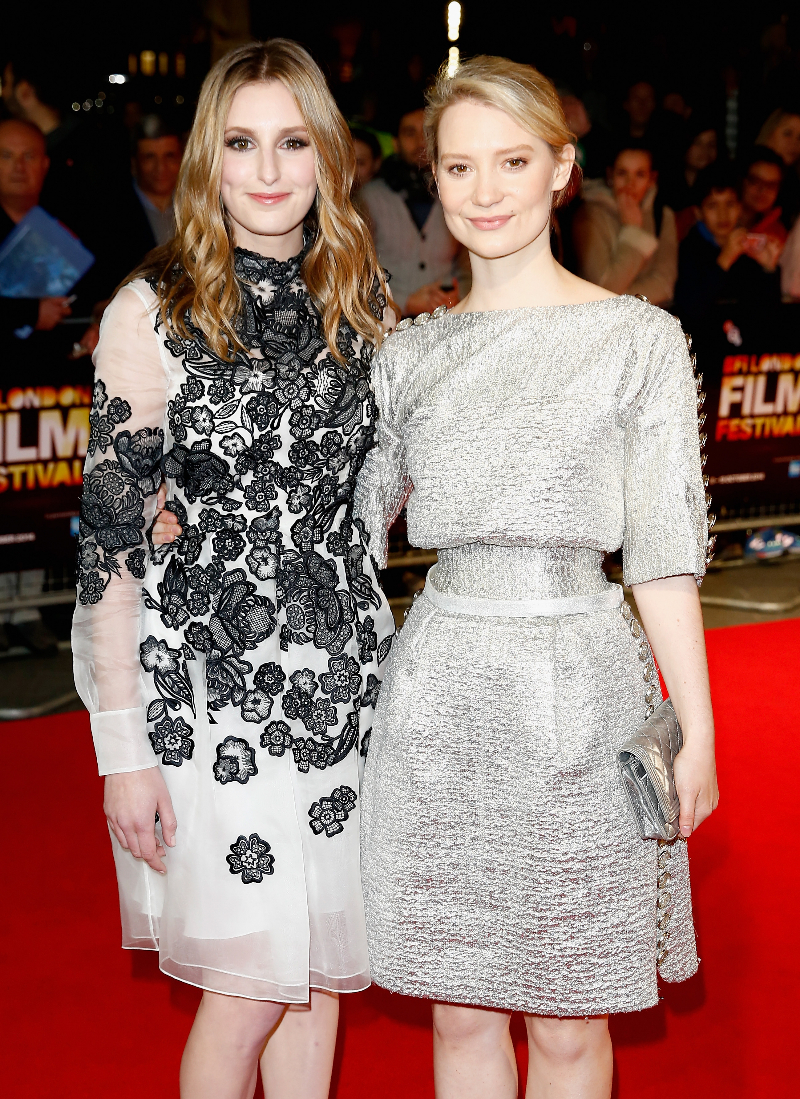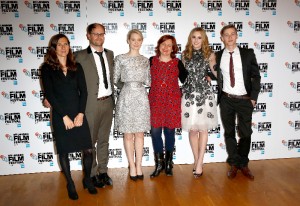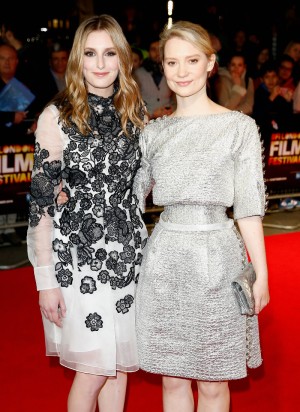London Film Festival 2014: Madame Bovary premiere – a chat with the cast on the red carpet

French director Sophie Barthes presents her own retelling of Gustav Flaubert’s classic debut starring Mia Wasikowska, Henry Lloyd-Hughes, Rhys Ifans, Laura Carmichael and Ezra Miller. Set in France, Madame Bovary tells the story of Emma, a farmer’s daughter who marries a young doctor named Charles Bovary. Soon tired of her husband and her life, Emma longs for romance and fulfilment, starting a couple of affairs. Briefly happy, she ultimately succumbs to depression. Adapted for the screen multiple times, this is the first time the classic material has been directed by a woman.
The Upcoming spoke to director Barthes and actors Luke Tittensor and Mia Wasikowska at Odeon West End in London.
Luke, what was your first recollection of this story? Did you ever read the novel?
LT: I’ve never read the novel, so I don’t really know how true this is to the actual book.
What was your initial reaction to reading the script?
LT: It’s an interesting script and I know it had a lot of punch to it so I just wanted to do it justice, especially with so many big names in it… and then just your local lad from Manchester.
So what was that like for you?
LT: It was good! I mean, everyone was wicked and it was a French and Belgian crew that had worked together a lot before so they had a good camaraderie off set as well. The producer was singing Rocket Man on the guitar… it was a wicked job.
And what has the transition from TV been like?
LT: This is still new to me. I am kind of new to the whole film game.
What have you got coming up?
LT: I am back to auditioning for now but I did a little thing for the BBC called Our World War – they have been doing a lot to commemorate World War I – so I played a real guy from Manchester called Paddy Kennedy. It was an amazing script and the crew on that was wicked.
Sophie, Madame Bovary is obviously a very character-focused story. If you could give one piece of advice to her, what do you think that would be?
SB: I think to stop projecting, because she is projecting on everyone. She’s projecting that her husband wants to be an ambitious doctor and he doesn’t, he just wants to be a simple guy. She is projecting on Leon, the young lover, that he’s a romantic hero and he’s not, he’s just a simple cleric. She’s projecting in the Marquis that he is going to love her and take her to Paris and that he’s a romantic and he’s absolutely not. So she keeps projecting and that’s why I think she’s unhappy, she can’t see people for what they are.
Do you think that ambition is her flaw?
SB: I think she’s very, very complicated. She’s dealing with bipolarity – probably the first bipolar character in literature. But she’s also someone who doesn’t want to live in a mediocre way, so it’s paradoxical. She can be self-destructive and at the same time she just doesn’t want to be a mediocre bourgeois person… she wants more. That’s the paradox of the character, which is very interesting. She’s not a victim but she’s not just a monster either. She wants the life she can have, we all do that, the better life – that’s very contemporary to me. There is a great British psychoanalyst called Adam Phillips who wrote about the unlived life, how we always project that we could have a better life, and that we don’t live our own lives because we always look somewhere else. So that’s the main advice [I would give Emma Bovary] but I don’t think it would help. If she lived today, she would probably have credit cards and just spend. She has a self-destructive nature and there isn’t much you can do about that – but it raises questions like why can’t you just be happy living your own life? Why do you want more?
Is that what attracted you to the material?
SB: Yes. The thing is, you can never fully grasp her. I read the book at different stages of my life and I think this book is a journey. When you read it as a teenager, you identify with her and you think she is so cool and so liberated as a woman and then you read it again as an adult, when you have a child and a husband, and you realise no, she is self-destructive. You grow up and you mature as a reader and it’s what Flaubert says, Madame Bovary isn’t reading books properly; she is reading romantic books and she doesn’t get the essence of things because she is too young. And she wants to grasp something but she doesn’t fully understand it. I think that’s interesting about the human condition, so it’s not just her character, it’s about human nature. It’s about the neurosis, it’s a very complex character.
And what was the character exploration like between you and your lead actress, Mia Wasikowska? How did that work?
SB: Mia is an extremely intuitive actress and I think she doesn’t like to intellectualise things, she just lives them. It’s a very emotional process and so she just does it. She gets it and she does it. And what I love about her is that she is extremely enigmatic as an actress, very ambiguous, you never know what it feels like on screen, you never know really. You can’t pinpoint an emotion. It’s very delicate what she does and I really like that and the camera loves that because there are many layers, a very strong inner life.
Flaubert was always searching for the right word. When you were making this film, were you searching for the right shot?
SB: In prep we worked a lot from paintings, so one of our main sources of inspiration was the Danish painter Hammershøi, and if you see his paintings they are always very controlled. So we worked a lot on the visual research for a year before we shot. We worked a lot with the production designer and the costumes to create a language for the film and an aesthetic that would resonate, so cinematography, production and costumes would come together to create this world. So the costumes are popping up and have very flashy colour and the production design is a little bit more subdued and the cinematography is very natural lighting, so we were trying to create this language for the screen to create an aesthetic.
Mia, we were talking to the director about how your character has so much ambition and is never really happy with her own life. To what extent to you think ambition can be healthy or when does it become much like your character?
MW: I think ambition is healthy as long as it doesn’t become obsession. But I like Emma because she definitely represents the emotions that we tend to “diss” in society, like rage or anger or jealousy, and I think it’s kind of great to look at someone who wasn’t at all a hero – she wasn’t perfect in any way – and to try to understand what was missing. So she’s a great character, multifaceted, and everybody has a different opinion and perspective on who she was.
Anne Korn
Madame Bovary is released in the UK as part of BFI London Film Festival on 11th October 2014.

























Facebook
Twitter
Instagram
YouTube
RSS